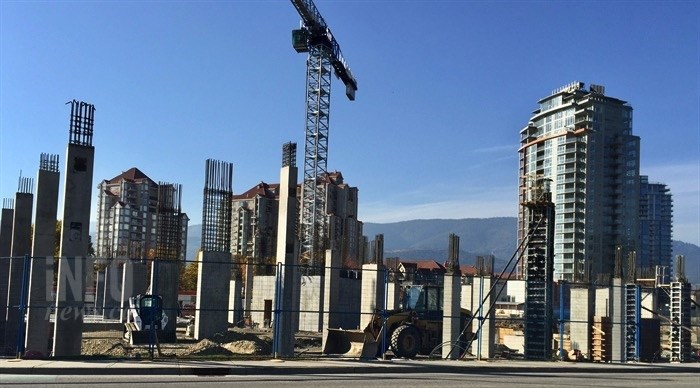
Construction of One Water Street in Kelowna is part of a housing boom that is slowing throughout B.C.
(ROB MUNRO / iNFOnews.ca)
November 07, 2018 - 11:00 AM
KELOWNA - A spike in provincial housing starts over the past couple of years is dropping off in 2018 and expected to decline even further in the next two years.
But don’t expect to see much change in housing affordability.
Canada Mortgage and Housing Corporation released its housing projections for 2019-20 this week. It shows a decline in both housing starts and new home construction starting this year.
“Resale market conditions in British Columbia have shifted significantly since the end of 2017 as higher mortgages rates, slower economic and population growth and housing-related policy changes have resulted in a 21 per cent decline in MLS Sales in the first eight months of 2018,” states the report.
Housing resales for B.C., peaked at 103,759 last year and were more than 100,000 in each of the two previous years. Those are expected to drop to around 80,000 this year and for the next two years.
But, the average price, which peaked at $709,597 in 2017 isn’t expected to moderate by much. Those stats provided give a high and low projection for 2018 through 2020, which show the possibility of either price declines or increases.
As for new housing starts, the report shows 31,446 for all of B.C. in 2015. That jumped to almost 42,000 in 2016 and peaked at 43,664 in 2017. It’s expected to drop to about to about 40,000 this year and to keep falling, possibly to 2015 levels by the end of 2020.
CMHC provides detailed forecasts for only four “Census Metropolitan Areas” but the only one in the Interior is Kelowna, which includes most of the Central Okanagan. It mirrors the rest of the province. Kelowna saw a record number of housing starts (3,577) last year – many of which are still under construction.
“For a few years, particularly 2016 and 2017, resale market inventory as well as new home inventories were cyclically low and so, to some extent, the number of projects that got underway, particularly in 2017, do represent supply trying to catch up and meet demand,” CMHC analyst Taylor Pardy told iNFOnews.ca in an email.
But Kelowna saw the same drop in population growth due, in part, to an improving economy in Alberta that is drawing workers to that province.
Pardy’s figures show that the Kelowna region’s population grew by just under 4,000 in 2015, peaked at 4,189 in 2016 then dropped to a net gain of 3,485 last year. No figures are yet available for 2018.
About two thirds of that growth was due to people moving to the Okanagan from other provinces versus about one third from other parts of B.C. and that held true for 2015 and 2016.
That ratio changed last year. While the same number of people came from other parts of B.C. in 2016 and 2017, the number from other provinces dropped significantly.
To contact a reporter for this story, email Rob Munro or call 250-808-0143 or email the editor. You can also submit photos, videos or news tips to the newsroom and be entered to win a monthly prize draw.
We welcome your comments and opinions on our stories but play nice. We won't censor or delete comments unless they contain off-topic statements or links, unnecessary vulgarity, false facts, spam or obviously fake profiles. If you have any concerns about what you see in comments, email the editor in the link above.
News from © iNFOnews, 2018